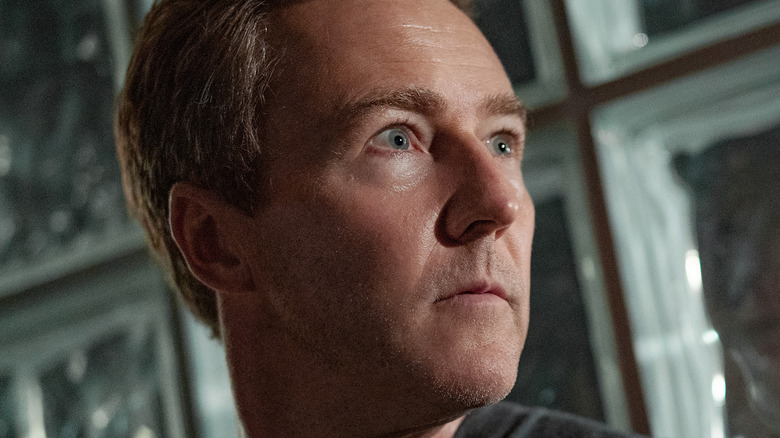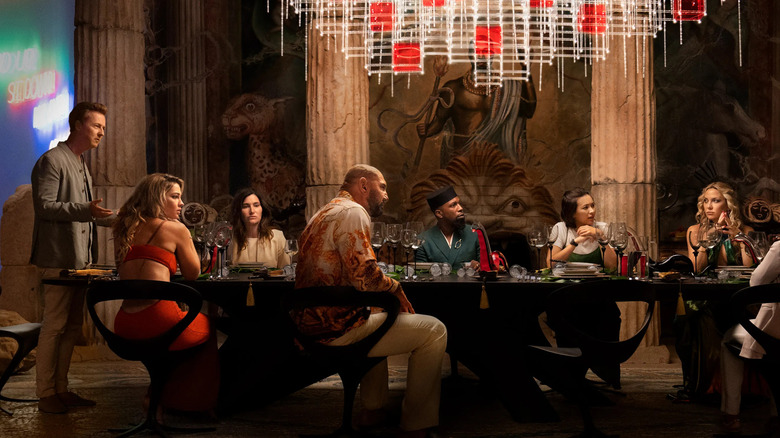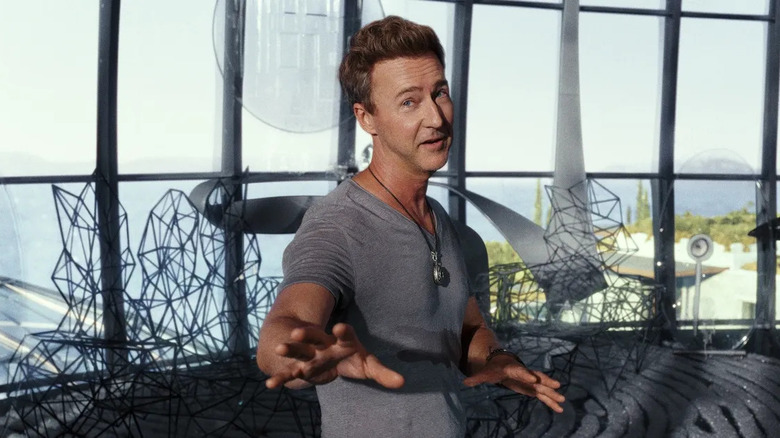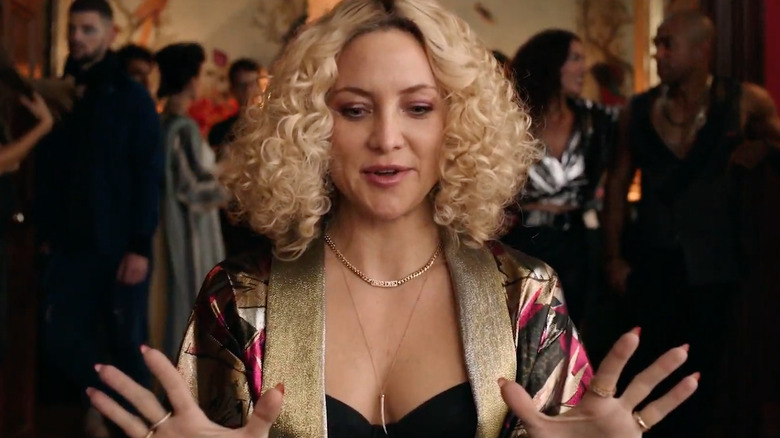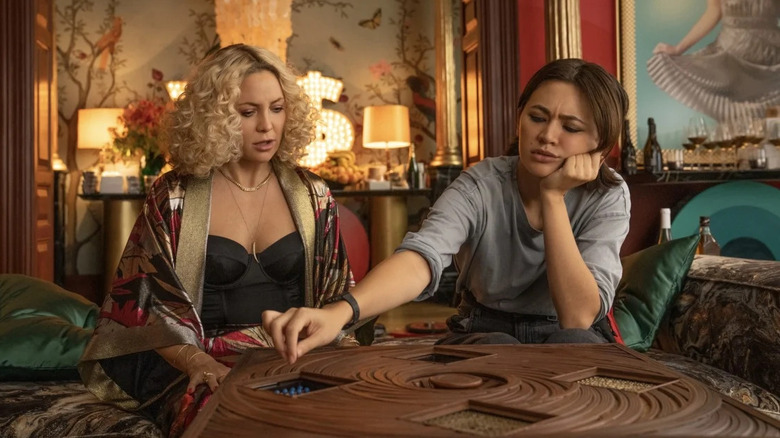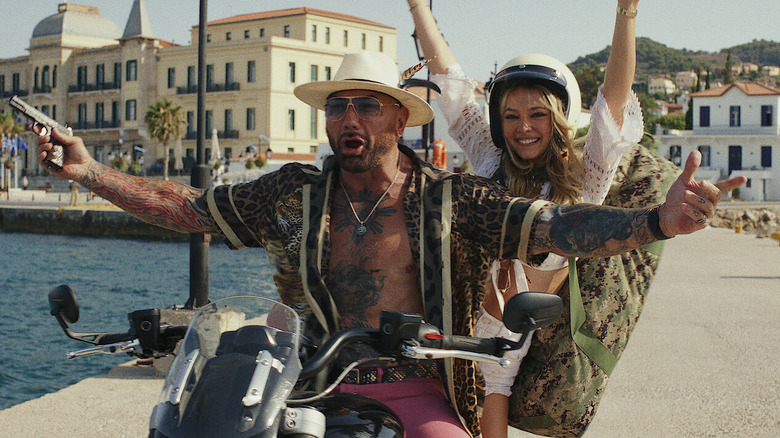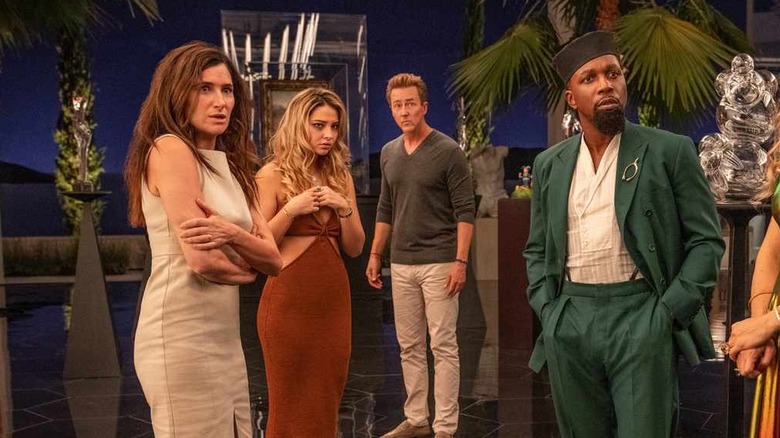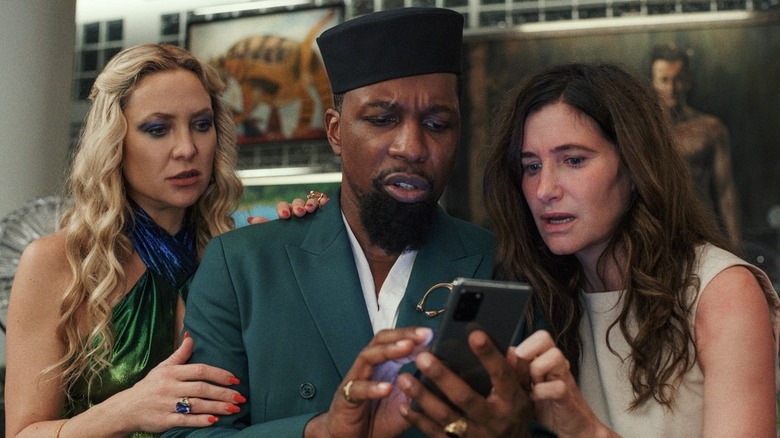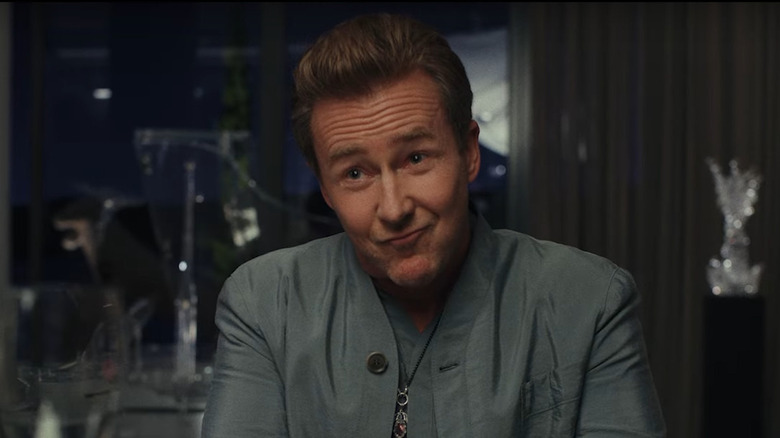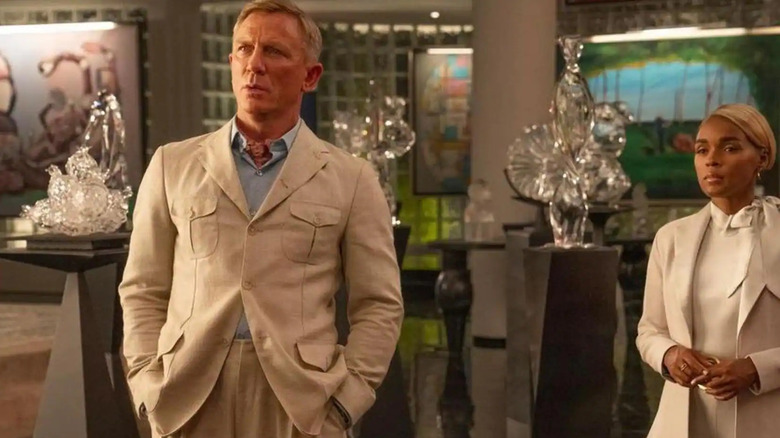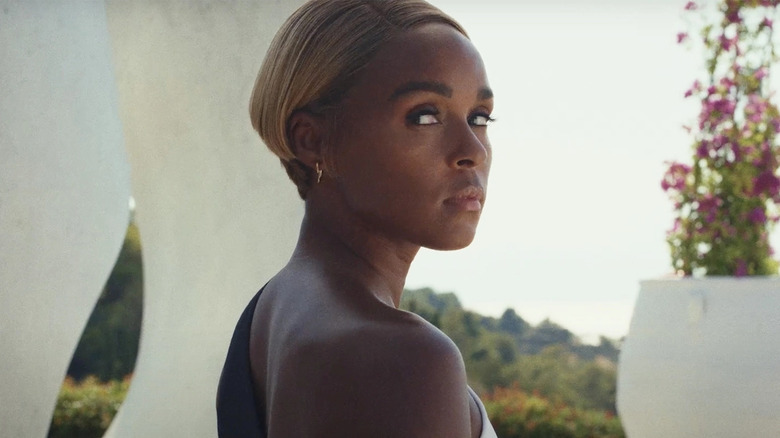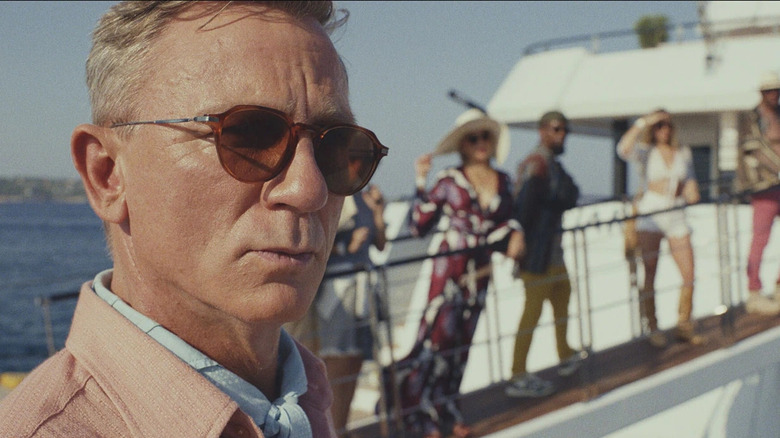Biggest Unanswered Questions From Glass Onion: A Knives Out Mystery
This article contains spoilers for "Glass Onion: A Knives Out Mystery."
With his 2019 hit "Knives Out," writer-director Rian Johnson helped reinvigorate the murder mystery movie. His modern take on the genre was twisty, funny, subversive, and surprisingly filled with socio-political commentary. That film tied up its plot in a satisfying bow as Marta (Ana de Armas) — wrapped in a blanket and sipping from a mug — watched the killer get carted off to prison from the balcony of the estate she just inherited from her generous former employer, as his awful family looks on in horror and disbelief.
Only Benoit Blanc, the world-famous detective (played by Daniel Craig) who cleared Marta's name, appears in the sequel, "Glass Onion: A Knives Out Mystery." "Glass Onion" is even more satirical and self-referential than "Knives Out," with additional outrageous characters stuck in an even more over-the-top location.
This time, attention-starved tech bro Miles Bron (Edward Norton) has invited fellow "disruptors" of their industries to a luxurious murder mystery weekend at the playboy hideaway on his own private Greek island. There is, or course, a real murder, and that murder does get solved, but the explosive climax and quick resolution of "Glass Onion" do leave some pressing questions unanswered — especially considering how unlikely it is that this particular cast of characters will appear in "Knives Out 3." Read on for a (spoiler-heavy) breakdown of the answers.
How did Andi make winners out of such terrible people?
As the pieces of the puzzle come together, it's revealed that Andi (Janelle Monáe) — not Miles — was the keystone of this friend group whose connection dates back to their young adulthood. In fact, Miles was the annoying, awkward outcast who was late to join in their revelry hanging out at the Glass Onion bar. Andi's stamp of approval is what gained a person admittance into the club, so Miles doesn't just have Andi to thank for the idea he stole, he owes his entire social life to her. What's more, he isn't the only one.
In flashback, "Glass Onion" shows that Andi enabled this morally-pliable group of misfits to reach for their individual stars — and it worked. Birdie Jay (Kate Hudson) became a cover girl and fashion designer. Claire (Kathryn Hahn) became a politician. Lionel (Leslie Odom Jr.) became a top scientist. Duke (Dave Bautista) became a YouTube celebrity. But how did she do it? Was kind, brilliant, gregarious Andi's encouragement enough? Was she such a smart and capable person that she made the people around her that much better? Or was she actively managing their careers and feeding them ideas?
After her death, they're all floundering. Lionel is starting to suspect that eccentric billionaire Miles is actually an idiot. Birdie's in over her head producing her apparel line. Claire is beholden to her dark money campaign funders. WIthout Andi keeping them honest and on track, her disruptor friends are shown to be merely incompetent, if not corrupt.
What did their company actually do?
The infighting and paranoia between this closed circle of friends can be traced back to a single napkin from the Glass Onion bar, upon which Andi had scribbled ideas for a tech start up. Andi and Miles went on to found that company together, and their joint venture grew into something so lucrative and broad in scope, it is experimenting with a new kind of renewable energy called Klear. Arguments over whether to take Klear to market caused the rift between Andi and Miles. Andi could see that it was too dangerous and unstable in its current form, and could bring down their business, if not the world. Miles thought it was worth the risk for the reward... billions if not trillions of dollars, not to mention political power.
When Andi wants out, who possesses the napkin and what, exactly, is written on it becomes a life-or-death legal issue. "Glass Onion" provides closure to that mystery, but it doesn't tell us much about what Andi, Miles, and their company originally did. It's not essential to the plot for viewers to know, but in an age when Silicon Valley CEOs believe themselves capable of anything, it would've been fun to find out about Andi's innovations and how they made their fortunes.
Did Birdie Jay take the fall for the sweatshop?
The audience meets Birdie Jay when everyone is supposed to be social distancing. Birdie, however, is throwing a crowded glitzy party, sans any COVID mitigations whatsoever. She's coded as a self-absorbed, superficial socialite who considers herself to be above the law. Birdie is all those things, and for much of "Glass Onion's" runtime, viewers are left to wonder if she might be capable of murder, too.
But, as it turns out, her biggest crime is that she just isn't smart enough to run a fashion label. Relatively early on, Miles makes sure to let Birdie know that she's in his debt and he expects her to take the fall for some scandal that's hovering above both of their heads like the sword of Damocles. The real scandal is Andi's murder, but there's also the matter of her clothing line, which uses inhumane labor practices and slave wages to keep profits high. This information is about to go public, and rather than have both of their reputations take the hit, Miles wants Birdie to assume full responsibility.
She is to blame, but not necessarily because she's an evil capitalist. When a corporate memo warned the factory they were about to subcontract was a sweatshop, Birdie Jay misunderstood this to mean a place where workout clothes are produced. Since she sells athleisure, she didn't get why this was a problem. Miles had Birdie all but convinced to confess to the press, but with those police boats approaching, it's unclear if Birdie still plans to come clean — or if she'll pin her (sort of) innocent mistake on the murderer.
Is Peg still working for Birdie Jay?
From the moment Birdie Jay receives her invitation, to the moment the police arrive via boat at the film's end, put-upon Peg is there helping her rich and famous boss to function. She's just as invested in the sweatshop debacle, because if Birdie goes down, she loses her job. While the audience doesn't know how much Peg makes or how well Birdie Jay treats her, it seems like the gig comes with perks (like a trip to Greece) and frustrations (like having to explain what a sweatshop is to an adult who happens to be your superior).
Flamboyant life of the party Birdie is probably fun to be around. Though there's an obvious class difference between them, Birdie does seem to appreciate Peg, and she is never shown to act with outright cruelty toward her. Being the personal assistant to a B-list celebrity wasn't her dream, but it must be fulfilling enough if she doesn't want the work to dry up if Birdie should get canceled. Still, from time to time throughout "Glass Onion," Peg looks and sounds as if she's over this lifestyle and ready to move on and put her abilities toward something less frivolous. Just as it is unknown if Birdie took the fall for the human rights abusing fashion label, it is unknown if Peg stuck with her through the murder mystery weekend's dramatic conclusion.
How did the murders affect Whiskey's brand?
When Whiskey (Madelyn Cline) first arrives on the scene, audiences might assume she's little more than Duke's most recent fling. After all, he's a men's rights activist and there's a noticeable age difference between the couple. But Whiskey is quickly revealed to be a woman very much in charge of her own narrative, as well as something of a double agent.
When she cozies up with Miles as Duke peeps through a bedroom window, seemingly devastated, it seems her true self is emerging. She's a gold digger trying to move up the ladder from social media guru to serious CEO. In the wake of Duke's death, it becomes clear that she and her not-so-jealous boyfriend were in cahoots. They thought that if Whiskey could seduce Miles, she could convince him to promote both of their brands with his new 24-hour media enterprise, garnering them more followers.
While Whiskey is upset that Duke's dead, the savvy aspiring influencer is the type of person who looks out for number one. It would be interesting to see how she spins the sure-to-be-newsworthy story of her boyfriend's murder into more star power.
Did Claire win her election?
At some point, Claire DeBella was an altruistic person who got into politics for the right reasons. The film gives viewers the sense that in the early days of her friendship with Andi, she was someone who wanted to affect change and would've balked at the idea of taking bribes or voting in favor of special interests at the expense of the people she sought to represent. But campaign finance laws are campaign finance laws, and Governor Claire DeBella is under the thumbs of her funders, namely Miles and the various industries that would stand to profit if government regulators give Klear the, well, all-clear.
From her anxious, cagey behavior and her whispered conversations with Lionel, it is apparent that Claire isn't thrilled to be in this position. She knows Klear's a disaster waiting to happen and she knows that the money she's accepting is tainted. During the events of "Glass Onion," she's currently locked in a tight race for the United States Senate, and if she doesn't support Miles (both in getting his energy source Congress's approval and in staying quiet about the napkin and Andi's murder), he and his cronies will pull their support of her candidacy.
Viewers might wonder, what would Claire do as governor or senator if corrupt oligarchs weren't pulling her strings? Does the arrest of Miles finally free her to lead and legislate as she truly would? To do that, she'd have to win her election, and "Glass Onion" ends abruptly, without comment.
Did Lionel stop the launch of Klear?
Andi split from her business partner Miles because she thought he was flying too close to the sun with his ambition to make Klear a viable replacement for oil, coal, and gas. Had it truly been viable, Andi would've stayed on board, but she knew that the substance wasn't just potentially deadly, but imminently deadly. In the film's opening sequence, as the puzzle box invitations of Miles are being delivered to his invited guests, viewers can tell he is putting intense pressure on Lionel to have a breakthrough (or to at least make it look like he's had a breakthrough).
He confesses as much to Claire in the pool, but it is unclear if he's motivated by protecting consumers or his position. It seems safe to assume that Lionel — a research scientist — is a smart guy. He must realize that, even if his employer strong-arms him into acting as Klear's credibility cover, his reputation will suffer once it shows itself to be a catastrophic failure. At the end of "Glass Onion," Lionel seems to think that Helen has done them all a favor by exposing Miles and his deeply flawed discovery. But its unclear whether the company, which is bigger than Miles is, put the brakes on the planned release of their supposedly game changing energy product. Klear could make an appearance or — perhaps — becoming a running joke in future Benoit Blanc mysteries.
What happened to Miles?
The characters in "Knives Out" are the types of entitled elites who aren't accustomed to facing consequences. As the mystery unfolds, for the first time in some of their lives, they do.
Richard gets caught cheating. Joni gets cut off financially, and Ransom goes to jail. But the hypocritical phonies and white collar criminals in "Glass Onion" wield more power and influence than the mere upper class publishing family of "Knives Out." Miles Bron in particular belongs to an entirely different class of entitled elite. Sure, the Thrombeys could afford nice homes and private schools from Harlan's stories, but they didn't bankroll Senate campaigns, own a Greek Island, or rent the Mona Lisa.
When Helen sits at the water's edge and sees the red and blue lights of the police boats blinking, it's implied that Miles will pay for his crimes. By the end of "Glass Onion," his rap sheet has gotten longer. Not only did he steal Andi's idea, he poisoned her and framed her death as a suicide. He killed Duke via his allergic reaction to his mixed drink. He attempted to kill Helen. He indirectly destroyed Leonardo da Vinci's masterpiece by circumventing its security measures. He was also about to launch a product that would've caused damage and death on an untold scale. Miles is probably going away for a long time, even if it seems likely that after the credits rolled, this weaselly credit-taker and his retained lawyers attempt every trick in the book to escape liability.
How did the world react to the destruction of the Mona Lisa?
From political references to product placement, Johnson peppers in plenty of clues that let audiences know the "Knives Out" movies take place in our present day reality. Or do they?
His characters and their companies and estates are whole-cloth creations, but that's par for the course in contemporary fiction. What really makes "Glass Onion" feel like an alternate reality is the inclusion of the subplot involving the Mona Lisa. In a narcissistic and desperate attempt to show off his wealth, Miles has rented da Vinci's iconic portrait of a half-smiling woman from the Louvre. It hangs on his wall under layers of protective glass controlled by an automated security system. But Miles, who never encountered a rule he couldn't break or ignore, has installed a button that allows him to override those safety measures.
"Glass Onion" reaches its crescendo as Helen begins to break every valuable item on display in the mansion. Others follow, and eventually, the unstable, flammable Klear that powers the place incinerates everything, including the most famous painting in the history of the world. For all their death and duplicity, the "Knives Out" movies are pretty small stakes in the grand scheme of things. The loss of the Mona Lisa feels like a very big deal. The first thought of the audience might be, was that really the Mona Lisa? Miles is definitely the kind of person who'd go to absurd lengths to fool even his closest friends into thinking he was that rich and well-connected. It could be an egomaniac's elaborate forgery. But if it was authentic, how will the world react to the cultural crime of the century, if not the millennia?
How did Helen's life change after the party?
The key to unlocking the mystery at the center of "Glass Onion" is the epiphany that Janelle Monáe is playing dual roles as identical twin sisters, Andi and Helen Brand. While Andi can be seen in flashbacks, in the present timeline, every instance in which the movie makes viewers feel they're watching Andi, they are actually watching Helen impersonating her dead sister — no small feat for the working class, small town mom. While Andi and Helen appear to have had a good sisterly relationship, their paths diverged about as much as twins' lives could. Power player Andi was a poised and polished globetrotter, while Helen leads an exceedingly normal life in comfortable clothes with her regional accent still in tact.
Benoit Blanc correctly deduces that bringing Helen, cosplaying Andi, will be the ultimate disruption to the disruptors' murder mystery affair, though at great risk to himself and the impostor sister. They pull off their scheme, thanks to some hot sauce, Helen's bravery, and the stupidity of Miles. Presumably, Helen will be able to prove in court that Andi was the originator of the napkin idea and that Miles killed her (and Duke) to prevent that information from coming out... which begs the question: what happens next for Helen? Will she inherit some or all of her late sister's fortune? Will she do something different with her newfound notoriety? Will she continue to partner with Benoit Blanc, now that she's proven herself to be a savvy sleuth?
What's Benoit Blanc's next case going to be?
As entertaining as "Glass Onion" can be, the mystery everyone will want solved after seeing it will be where Blanc goes next. Johnson signed a $450 million deal with Netflix to continue making "Knives Out" movies. "Knives Out 3" is a bit of a misnomer. He doesn't consider them to be sequels, but installments in the style of Agatha Christie novels, thus the subtitle, "A Knives Out Mystery." The third one is expected to release sometime in 2024.
Craig is slated to return, and this time, Blanc's personal life could be part of the equation. The director has confirmed that Blanc is queer, which is subtext in previous films but might become text in the third, given Johnson's disclosure. Other than that, a third Johnson-Craig team up will almost certainly take place in a new location, with a new closed circle of villains, victims, and innocent bystanders testing Benoit Blanc's professional acumen and patience.
